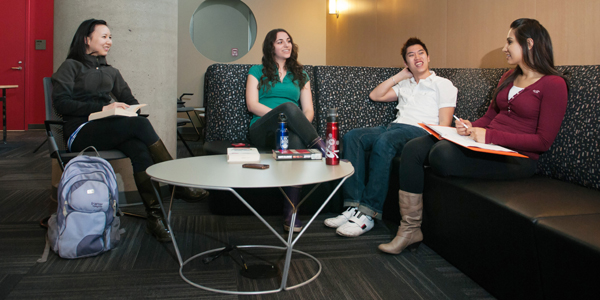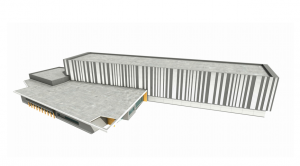
Students at the renovated Koerner Library space.
These are challenging, yet exciting times for UBC Library. Technology is evolving rapidly. Services and collections are consolidating. Student learning is becoming more group-focused, multidisciplinary and attuned to the online environment. The demand for additional electronic resources and access continues to grow.
UBC Library is reimagining itself in the midst of these shifts, bolstered in part by surveys that have highlighted the space needs of students. Indeed, physical spaces involve more than infrastructure – they are also viewed through the lens of engagement, allowing and encouraging users to interact and connect with each other, and with staff and collections.
Space changes have also triggered looking at service points differently. Both Koerner Library and the Irving K. Barber Learning Centre unveiled consolidated service desks this past year. Having a one-stop point allows users to check out books, ask reference questions and receive IT support – all from a single hub (a similar service model is planned for Woodward Library).
Students may also have noticed a number of refurbished spaces being created this past year, including pavilion-style gathering points in the Irving K. Barber Learning Centre to support peer learning and coaching; increased student seating at the growing Okanagan Library; and the addition of the Research Commons for graduate students at Koerner Library.
“These changes are part of a larger trend where academic libraries are providing technology that not only supports access to online resources, but allow for the creation of new knowledge,” says Simon Neame, Director of the Learning Centre. “Libraries then become a place of both information access and knowledge creation.”

The Library continues to re-envision its spaces, in part by moving its low-use collections further out on campus. The proposed BC Integrated Research Library (IRL) is a high-density storage facility, ideally located at the south end of UBC Vancouver’s research precinct. The IRL will provide much-needed space for UBC’s ever-growing collections, and features environmental controls that extend the life of books. Relocation of various library materials to the IRL will free up more library space in branches for user-focused services such as specialized labs or the hosting of unique collections.
There is no denying that the footprint of UBC’s libraries is changing, says Teresa Syrnyk, a Senior Planner at UBC Infrastructure development, adding that library places accommodate a range of activities that include rehearsals, research, social interaction, experiments, practice, group collaborations and “spaces that contain enabling technologies and program areas for all manner of student learning and assistance.”
Read more from UBC Library’s Community Report (2013).